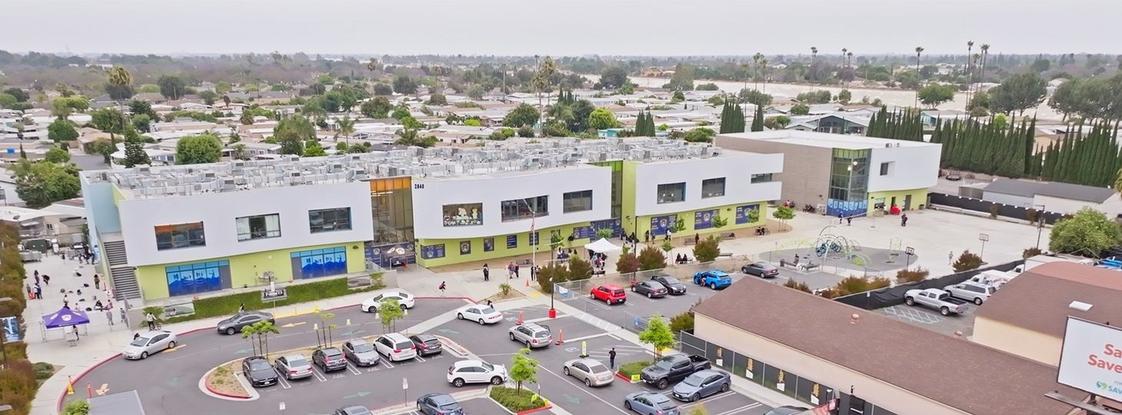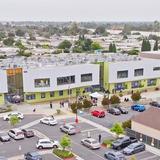Serving 504 students in grades Kindergarten-12, Magnolia Science Academy Santa Ana ranks in the bottom 50% of all schools in California for overall test scores (math proficiency is top 50%, and reading proficiency is top 50%).
The percentage of students achieving proficiency in math is 29% (which is lower than the California state average of 33%). The percentage of students achieving proficiency in reading/language arts is 37% (which is lower than the California state average of 47%).
The student:teacher ratio of 17:1 is lower than the California state level of 21:1.
Minority enrollment is 88% of the student body (majority Hispanic), which is higher than the California state average of 80% (majority Hispanic).
Quick Stats (2025)
- School Type: Charter School
- Grades: Kindergarten-12
- Enrollment: 504 students
- Student:Teacher Ratio: 17:1
- Minority Enrollment: 88%
- Graduation Rate: ≥90% (Top 50% in CA)
- Overall Testing Rank: Bottom 50%
- Math Proficiency: 29% (Top 50%)
- Reading Proficiency: 37% (Btm 50%)
- Science Proficiency: 20-24% (Btm 50%)
- Source: National Center for Education Statistics (NCES), CA Dept. of Education
Top Rankings
Magnolia Science Academy Santa Ana ranks among the top 20% of public schools in California for:
Category
Attribute
Student Attention
School Overview
Magnolia Science Academy Santa Ana's student population of 504 students has declined by 25% over five school years.
The teacher population of 30 teachers has declined by 9% over five school years.
School Type
Grades Offered
Grades Kindergarten-12
Total Students
504 students
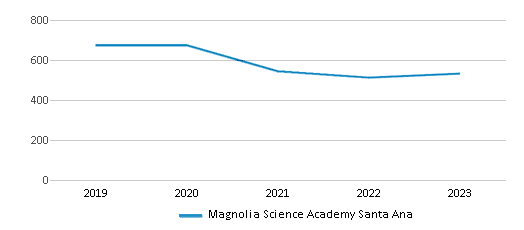
Gender %
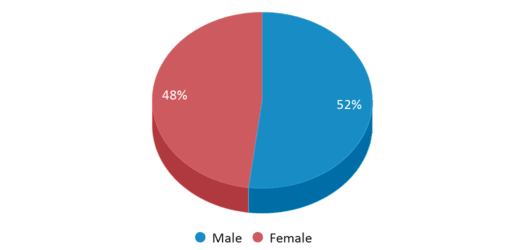
Total Classroom Teachers
30 teachers
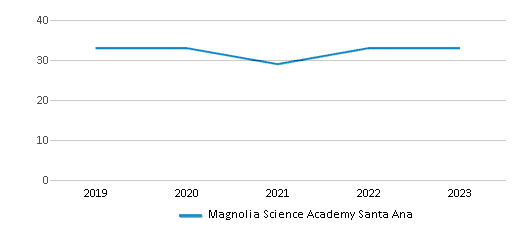
Students by Grade
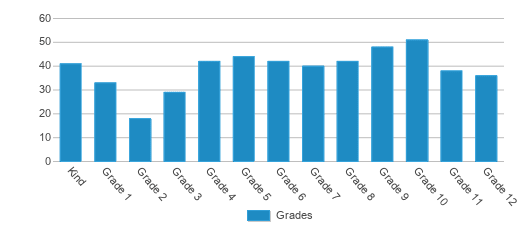
School Rankings
Magnolia Science Academy Santa Ana ranks within the bottom 50% of all 9,602 schools in California (based off of combined math and reading proficiency testing data).
The diversity score of Magnolia Science Academy Santa Ana is 0.31, which is less than the diversity score at state average of 0.63. The school's diversity has stayed relatively flat over five school years.
Overall Testing Rank
#5004 out of 9602 schools
(Bottom 50%)
(Bottom 50%)
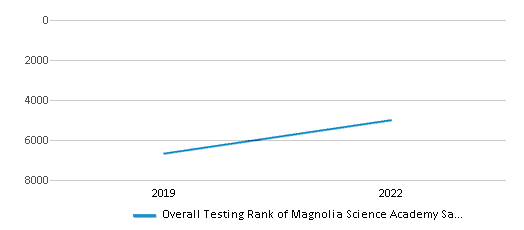
Math Test Scores (% Proficient)
29%
33%
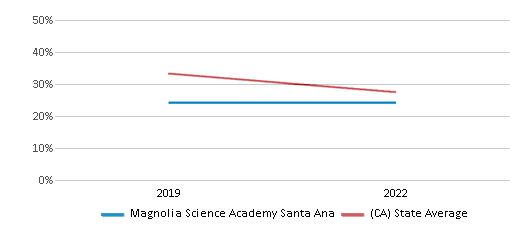
Reading/Language Arts Test Scores (% Proficient)
37%
47%
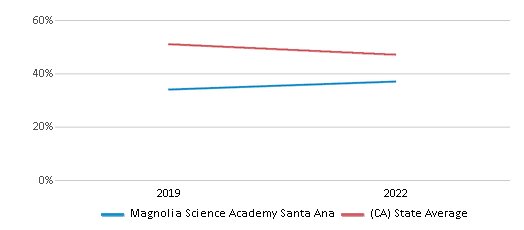
Science Test Scores (% Proficient)
20-24%
29%
Student : Teacher Ratio
17:1
21:1
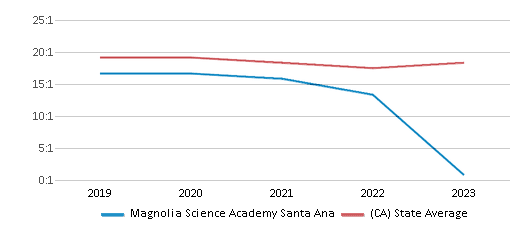
American Indian
1%
1%
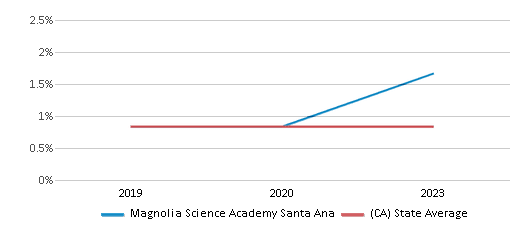
Asian
3%
12%
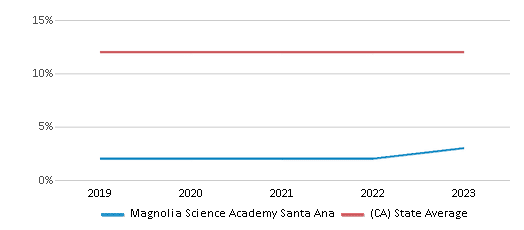
Hispanic
82%
56%
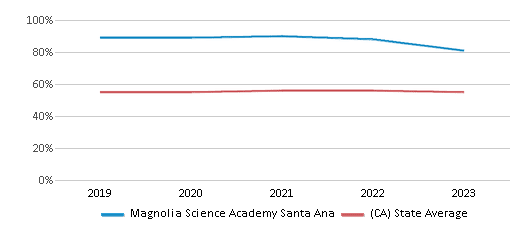
Black
2%
5%
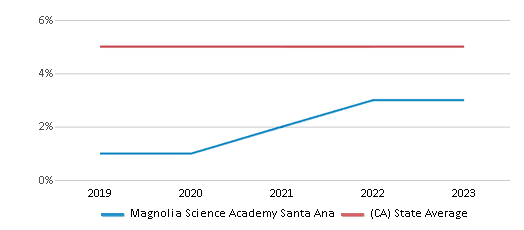
White
12%
20%
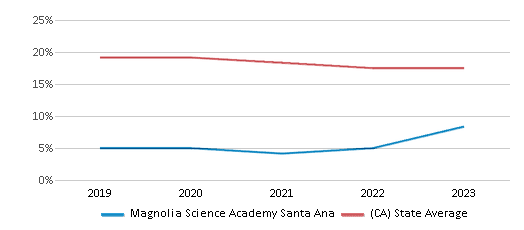
Hawaiian
n/a
n/a
Two or more races
n/a
6%
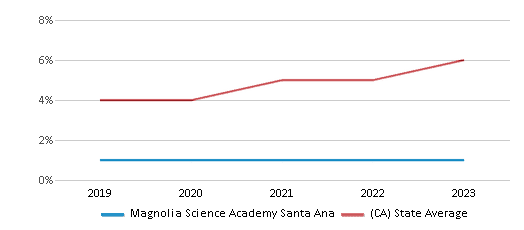
All Ethnic Groups
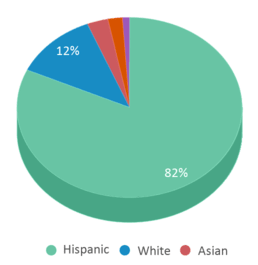
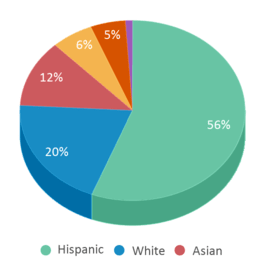
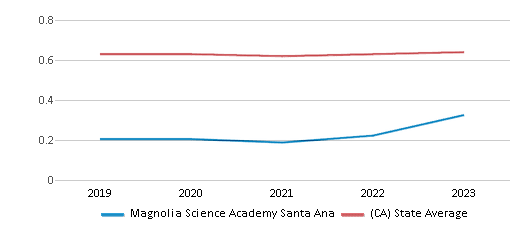
Graduation Rate
≥90%
87%
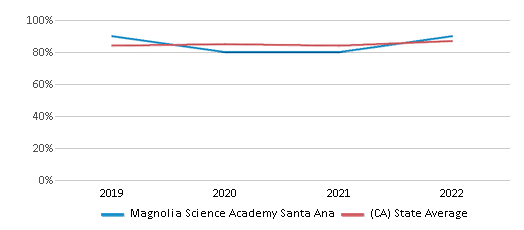
Eligible for Free Lunch
73%
54%
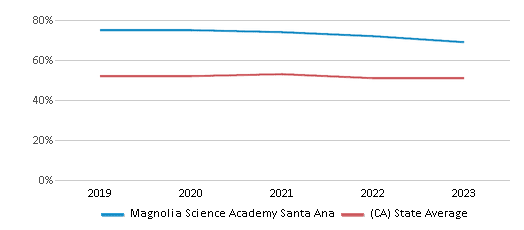
Eligible for Reduced Lunch
7%
8%
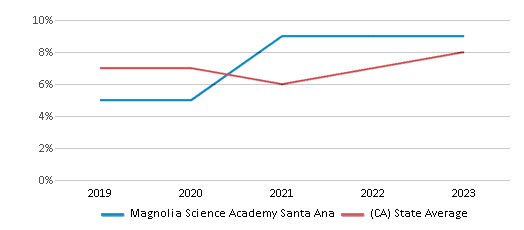
School Statewide Testing
School District Name
Sports
Total Sports Offered
5 sports
Sports
Basketball, Cross Country, Soccer, Track and Field, Volley Ball
Extracurriculars
Total ExtracurricularsTotal Extra-curric.
3 extracurriculars
ExtracurricularsExtra-curric.
Club or Organization:
CIF Sports, Elementary and Middle School Sports
Arts and Music Programs:
Music Band for Elementary
CIF Sports, Elementary and Middle School Sports
Arts and Music Programs:
Music Band for Elementary
Source: National Center for Education Statistics (NCES), CA Dept. of Education
School Notes
- Magnolia Science Academy -Santa Ana (MSA-SA) is one of the Magnolia Public Schools founded as a public charter school in Fall 2009. MSA-SA currently serves over 550 students, grades TK through 12.
- MSA-SA is a classroom-based charter school serving grades TK12 with a curriculum emphasis on science, technology, engineering, arts, and math. The school primarily serves students and parents in the Orange County area.
- Magnolia Science Academy Santa Ana is ranked 69th within California and 7th within Orange County by U.S. Best High Schools Rankings.
Profile last updated: 02/09/2025
Frequently Asked Questions
What is Magnolia Science Academy Santa Ana's ranking?
Magnolia Science Academy Santa Ana is ranked #5004 out of 9,602 schools, which ranks it among the bottom 50% of public schools in California.
What schools are Magnolia Science Academy Santa Ana often compared to?
Magnolia Science Academy Santa Anais often viewed alongside schools like Samueli Academy by visitors of our site.
What percent of students have achieved state testing proficiency in math and reading?
29% of students have achieved math proficiency (compared to the 33% CA state average), while 37% of students have achieved reading proficiency (compared to the 47% CA state average).
What is the graduation rate of Magnolia Science Academy Santa Ana?
The graduation rate of Magnolia Science Academy Santa Ana is 90%, which is higher than the California state average of 87%.
How many students attend Magnolia Science Academy Santa Ana?
504 students attend Magnolia Science Academy Santa Ana.
What is the racial composition of the student body?
82% of Magnolia Science Academy Santa Ana students are Hispanic, 12% of students are White, 3% of students are Asian, 2% of students are Black, and 1% of students are American Indian.
What is the student:teacher ratio of Magnolia Science Academy Santa Ana?
Magnolia Science Academy Santa Ana has a student ration of 17:1, which is lower than the California state average of 21:1.
What grades does Magnolia Science Academy Santa Ana offer ?
Magnolia Science Academy Santa Ana offers enrollment in grades Kindergarten-12
What school district is Magnolia Science Academy Santa Ana part of?
Magnolia Science Academy Santa Ana is part of Magnolia Science Academy Santa Ana School District.
School Calendar
View the Magnolia Science Academy Santa Ana yearly calendar below.
School Reviews
Review Magnolia Science Academy Santa Ana. Reviews should be a few sentences in length. Please include any comments on:
- Quality of academic programs, teachers, and facilities
- Availability of music, art, sports and other extracurricular activities
Recent Articles

What Is A Charter School?
Explore the world of charter schools in this comprehensive guide. Learn about their history, how they operate, and the pros and cons of this educational innovation. Discover key facts about charter schools, including admission policies, demographics, and funding, as well as what to look for when considering a charter school for your child.

10 Reasons Why High School Sports Benefit Students
Discover the 10 compelling reasons why high school sports are beneficial for students. This comprehensive article explores how athletics enhance academic performance, foster personal growth, and develop crucial life skills. From improved fitness and time management to leadership development and community representation, learn why participating in high school sports can be a game-changer for students' overall success and well-being.

February 05, 2025
Understanding the U.S. Department of Education: Structure, Impact, and EvolutionWe explore how the Department of Education shapes American education, from its cabinet-level leadership to its impact on millions of students, written for general audiences seeking clarity on this vital institution.


